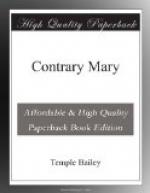Mary could fancy what they had said.
“Oh, Cousin Patty, Cousin Patty,” she cried, “Do you think he will ever forgive me? I have let such people talk to me, and I have listened!”
CHAPTER XXII
In Which the Garden Begins to Bloom; and in Which Roger Dreams.
March, which brings to the North sharp winds and gray days, brings to the sand-hill country its season of greatest beauty.
Straight up from the unpromising soil springs the green—the pines bud and blossom, everywhere there is the delicate tracery of pale leafage, there is the white of dogwood, the pink of peach trees and of apple bloom, and again the white of cherry trees and of bridal bush. There are amethystine vistas, and emerald vistas, and vistas of rose and saffron—the cardinals burn with a red flame in the magnolias, the mocking-birds sing in the moonlight.
It was through the awakened world that Roger drove one Sunday to preach to his people.
He did not call it preaching. As yet his humility gave it no such important name. He simply went into the sand-hills and talked to those who were eager to hear. Beginning with the boy, he had found that these thirsty souls drank at any spring. The boys listened breathless to his tales of chivalry, the men to his tales of what other men had achieved, the women were reached by stories of what their children might be, and the children rose to his bait of fairy books and of colored pictures.
Gradually he had gone beyond the tales of chivalry and the achievements of men. Gradually he had brought them up and up. Other men had preached to them, but their preaching had not been linked with lessons of living. Others had cried, “Repent,” but not one of them had laid emphasis on the fact that repentance was evidenced by the life which followed.
But Roger stood among them, his young face grave, his wonderful voice persuasive, and told them what it meant to be—saved. Planting hope first in their hearts, he led them toward the Christ-ideal. Manhood, he said, at its best was godlike; one must have purity, energy, education, growth.
And they, who listened, began to see that it was a spiritual as well as practical thing to set their houses in order, to plant and to till and to make the soil produce. They saw in the future a community which was orderly and law-abiding, they saw their children brought out of the bondage of ignorance and into the freedom of knowledge. And they saw more than that—they saw the Vision, faintly at first, but with ever-increasing clearness.
It was a wonderful task which Roger had set for himself, and he threw himself into his work with flaming energy. He hired a buggy and a little fat horse, and spent some of his nights en route in the houses of his friends along the way; other nights—and these were the ones he liked best—he slept under the pines. With John Ballard’s old Bible under his arm, and his prayer-book in his pocket, he went forth each week, and always he found a congregation ready and waiting.




